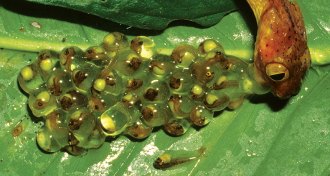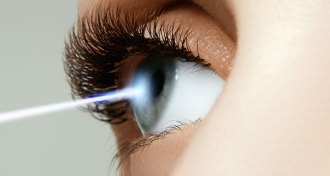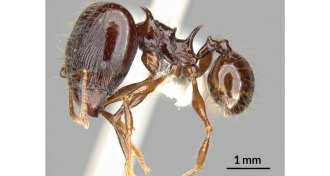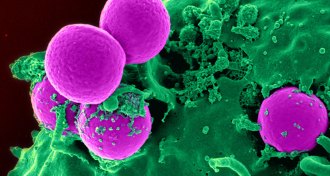Uncategorized
-
 Animals
AnimalsHow Houdini tadpoles escape certain death
High-speed video of red-eyed tree frog embryos reveals the secrets to their getaway plans.
-
 Life
LifeHuman eye spots single photons
Human eyes are sensitive enough to detect individual particles of light.
-
 Oceans
Oceans50 years ago, humans could pick the oceans clean
Scientists have long recognized that we might overfish the oceans. Despite quotas, some species are paying the price of human appetite.
-
 Earth
EarthScience finds many tricks for traveling to the past
Our editor in chief discusses what science can tell us about the past.
By Eva Emerson -
 Animals
AnimalsReaders ponder animal flight
Readers respond to the June 11, 2016, issue of Science News with questions on cormorants, butterflies, virus-sensing genes and more.
-
 Life
LifeDistinctions blur between wolf species
Red and eastern wolves might be gray wolf/coyote blends instead of distinct species
-
 Animals
AnimalsNewly discovered big-headed ants use spines for support
Two newly discovered ant species provide new insights into spiny evolution.
-
 Earth
EarthNew scenario proposed for birth of Pacific Plate
The Pacific tectonic plate formed at the junction of three other plates and above of the remains of a submerged plate, geophysicists propose.
-
 Life
LifeThe nose knows how to fight staph
A bacterium isolated from the nose produces a new antibiotic active against resistant pathogens.
By Eva Emerson -
 Planetary Science
Planetary ScienceJupiter’s Great Red Spot is hot
High temperatures over Jupiter’s Great Red Spot suggest that storms pump heat into the atmosphere and warm the entire planet.
-
 Chemistry
ChemistryVaping’s toxic vapors come mainly from e-liquid solvents
New study homes in on a primary source of toxic vaping compounds: the thermal breakdown of solvents used to dissolve flavorings in e-liquids. And older, dirtier e-cigs generate more of these toxicants, study shows.
By Janet Raloff -
 Earth
EarthIron-loving elements tell stories of Earth’s history
By studying geochemical footprints of rare elements, researchers get a glimpse of the planet’s evolution.